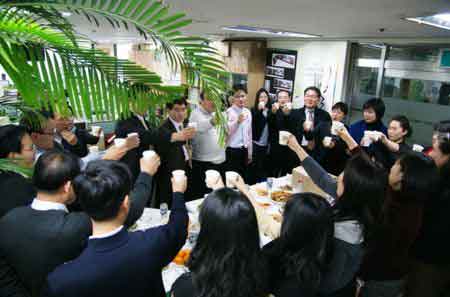韓國某就業(yè)門戶網(wǎng)站的最新民調(diào)顯示,越來越多的公司職員對年終聚會(huì)感到厭倦。調(diào)查顯示,近70%的被調(diào)查者稱,他們受夠了年終聚會(huì),更希望以其他方式來結(jié)束辛苦工作的一年。21.5%的被調(diào)查職員表示,他們本不喜歡參加圣誕期間的公司年終聚會(huì),但不得不屈服于老板的壓力。只有8.6%的職員對年終聚會(huì)表示期待。在被問及最不喜歡的聚會(huì)時(shí),60.9%的人稱,公司等級森嚴(yán)的正式聚會(huì)最令人厭煩,讓人無法放松。其次就是沒完沒了的狂歡酒會(huì)(55.6%)。另有26.3%的職員稱不喜歡公司舉辦沒有征詢員工意見的例行聚會(huì)。
58.9%的職員表示更喜歡去聽音樂會(huì)或者與同事參加有趣的社交活動(dòng)。40%的受訪者更支持舉辦頒獎(jiǎng)典禮,犒賞勤奮的員工。30.8%的人希望能夠參加志愿活動(dòng)。18.2%的受訪者表示,如果能夠參加更具教育意義的活動(dòng),學(xué)習(xí)到一些新東西,感覺會(huì)更好。

|
 |
|
End-of-year parties held by Korean companies. [file photo] |
Companies that are planning end-of-year parties or banquets to promote team-building and give their employees a pat on the back for all their hard work in 2011 may want to think outside the box this year and eschew the binge-drinking events that are so common at this time of year.
Seven out of 10 respondents, or 69.9 percent, are fed up with the practice and would prefer an alternative way of ringing out the working year, according to a recent straw poll of 1,035 office workers by recruitment portal Job Korea.
Some 21.5 percent replied that they have no choice but to participate in drinking sessions during the Christmas season, due to pressure from their bosses, while a mere 8.6 percent said they looked forward to such office parties.
In response to multiple-choice questions about which gatherings they disliked the most, 60.9 percent cited formal arrangements where the office hierarchy makes it all but impossible to relax. This was followed by endless rounds of drinking (55.6 percent), routine events organized by the company without consulting staff (26.3 percent).
As alternatives, 58.9 percent of respondents suggested going to a concert or engaging in some fun social activity with their colleagues. Some 40 percent were in favor of holding award ceremonies to fete hard-working employees, 30.8 percent wanted to take part in volunteering activities to help those in need, and 18.2 percent said they would appreciate a more educational program or activity where they can learn something new.
a pat on the back: 贊揚(yáng),鼓勵(lì)
think outside the box: 跳出固有思維模式,跳脫框架思考
相關(guān)閱讀
經(jīng)濟(jì)形勢好轉(zhuǎn) 澳公司圣誕支出大增
德國:經(jīng)濟(jì)危機(jī)下恢復(fù)圣誕真諦
年會(huì)恐懼癥 year-end party phobia
(Agencies)

(中國日報(bào)網(wǎng)英語點(diǎn)津?Rosy 編輯)
